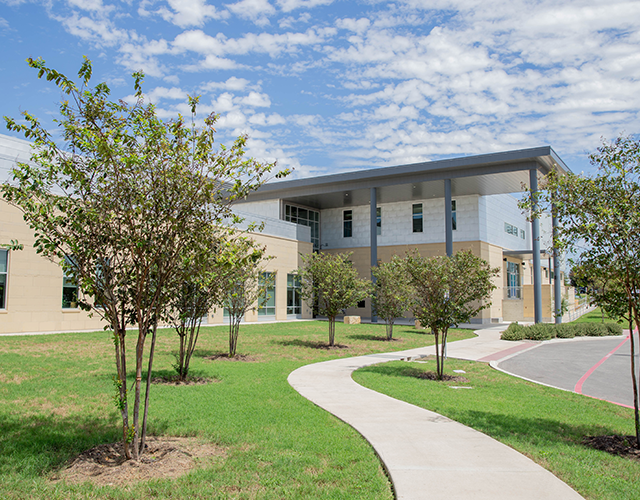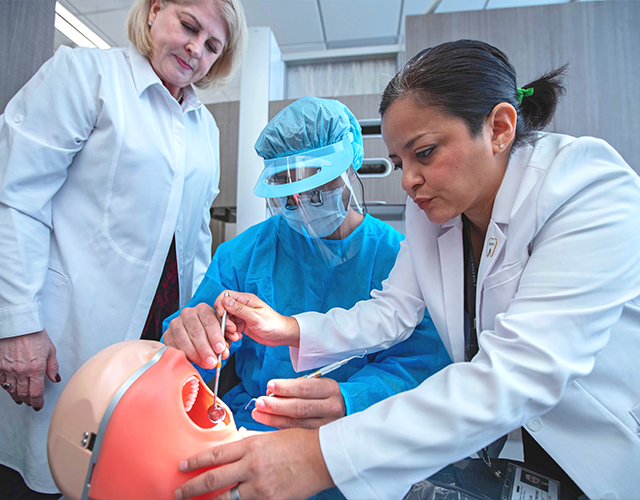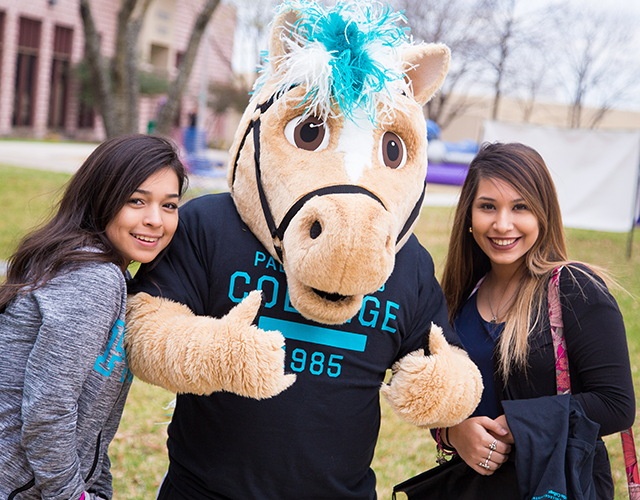|
Quality Enhancement Plan (QEP)
|
This page provides information about Palo Alto College’s Quality Enhancement Plan (QEP), which focuses on implementing embedded tutoring in high-challenge courses. Embedded tutoring connects students to tutors who are in the classroom and can offer immediate support. Just-in-time tutoring assistance provides students with a tangible bridge connecting them to course content, their tutor, their classroom community, and, ultimately, academic success. |
What is a QEP?The Quality Enhancement Plan (QEP) is a component of the reaffirmation process required by the Southern Association of Colleges and Schools Commission on Colleges (SACSCOC). It reflects and affirms the College’s commitment to enhance overall institutional quality and effectiveness by developing a formal plan that focuses on an issue the institution considers important to improving specific student learning outcomes and/or student success. |
What is Palo Alto College’s QEP?In June 2020, the College community selected Embedded Tutoring in High-Challenge Courses as the QEP topic.
|
Which high-challenge courses will have embedded tutors?
|
What is the timeline for the QEP?The QEP is a five-year project extending from Spring 2022-Spring 2027 and has three phases.
|
How will the QEP work?
|
How will the QEP improve student success?The QEP has been designed to help students achieve four Learning Outcomes which will be regularly assessed throughout the 3-year Implementation Phase. QEP STUDENT LEARNING OUTCOMES
These outcomes will be assessed quantitatively through course performance metrics and qualitatively through student survey and focus group data. Faculty and tutors will be surveyed at the end of each term to identify successes and areas for improvement. |
| Key Dates in the QEP Timeline | |
|---|---|
|
17 August 2021 |
QEP Update to the PAC community at Fall Convocation |
|
3 September 2021 |
Quality Enhancement Plan sent to SACSCOC |
|
September – October 2021 |
QEP promotional activities |
|
25-28 October 2021 |
SACSCOC Reaffirmation Team Site Visit to PAC |
|
January 2022 |
Response, if needed, to SACSCOC recommendations about the QEP |
|
February 2022 |
Identify QEP Co-Directors |
|
Spring 2022 |
Identify faculty and tutors for fall QEP implementation |
|
Summer 2022 |
First Embedded Tutoring Summer Workshop (May) |
|
Fall 2022 |
QEP implementation begins |
|
SACSCOC Resources The Quality Enhancement Plan Framework (December 2018) SACSCOC Handbook for Institutions Seeking Reaffirmation (February 2020 edition) |
Palo Alto College Resources QEP Executive Summary (PDF) PAC Quality Enhancement Plan Document (PDF) QEP Flyer (PDF) |
The Quality Enhancement Plan (QEP) is part of the College’s accreditation process. The regional accrediting body, The Southern Association of Colleges and Schools Commission on Colleges (SACSCOC), requires its member institutions to develop and implement, over a five-year period, a detailed, carefully designed action plan that addresses a focused, well-defined topic or issue pertaining to the enhancement of student learning outcomes and/or student success.
The Quality Enhancement Plan provides an opportunity for the College to identify a specific aspect of student learning/student success that can be improved and then develop a detailed comprehensive plan to effect improvement.
The QEP aligns with the College’s Strategic Direction of Student Empowerment, an enduring institutional commitment to help students succeed academically and professionally.
Palo Alto College’s regional accrediting body, The Southern Association of Colleges and Schools Commission on Colleges (SACSCOC), will evaluate the Quality Enhancement Plan on five criteria:
- Topic: The institution identified a topic through its ongoing, comprehensive planning and evaluation processes.
- Broad-based Support: The topic has broad-based support of institutional constituencies.
- Focus: The plan focuses on improving specific student learning outcomes and/or student success.
- Resources: The institution commits resources to initiate, implement, and complete the QEP.
- Assessment: The institution has developed a plan to assess the achievement of its QEP.
Starting in August 2019, a series of college-wide presentations created the backdrop for the selection of a QEP topic grounded in the College’s quest for continuous improvement. Presentation topics included: the 2019-2024 Strategic Plan, the College’s Key Performance Indicators (KPIs), and current institutional and student data. Concurrent with the campus-wide data review, an employee survey was launched to identify possible QEP topics.
In January 2020, a student survey was conducted to identify students’ perceptions of the challenges that impeded their success as learners. Four key themes emerged in both the employee survey and the student survey. These four intersecting themes highlighted a need for: 1) more opportunities for active learning, 2) more supportive faculty-student connections, 3) more tutoring resources, and 4) more focus on boosting students’ self-confidence. Each theme suggested numerous strategies that could serve as a QEP focus. A survey of members of the Faculty Senate and Staff Senate in May 2020 narrowed the many possible QEP strategies to six QEP finalists.
In June 2020, a representative cross section of the College (faculty, staff, students, and administrators) met for an in-depth discussion of each of the six finalists that culminated in the selection of the QEP topic.
|
Six QEP Finalists Career Services |
An advocate for each of the finalists facilitated a research-based presentation linking the finalist to relevant institutional data and student need. Each presentation was followed by questions and extensive discussion that underscored the rationale for choosing the finalist as the College’s QEP topic.
After in-depth discussions of each of the six finalists concluded, a vote was taken to select the College’s QEP topic. “Tutors Embedded in High-Challenge Courses” garnered the most support.
The following graphic illustrates the continuous interconnection between institutional data and the voices of the college community that characterized the topic selection process.
ContactInformation |
Jennifer Scheidt, Chair, English, INRW & Foreign Languages Co-Director, QEP Planning Committee Email: |
Thomas Murguia, Academic Program Director Co-Director, QEP Planning Committee Email: |




